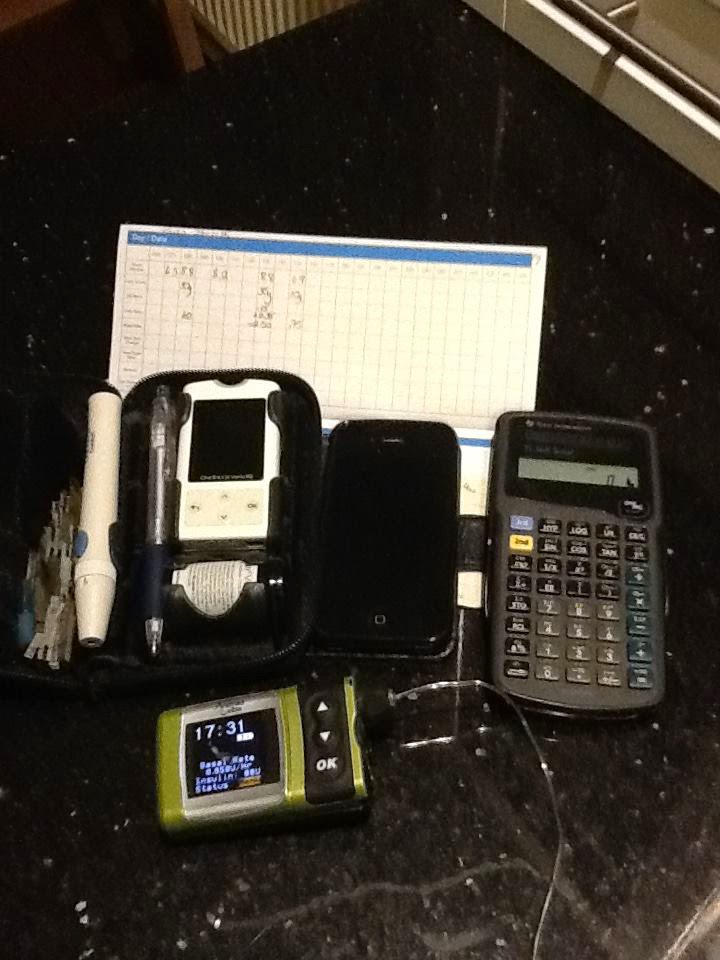Last November, I got a smartphone, finally. I love technology but I hate change, which is a bit of an oxymoron. So, I fought with myself over and over about upgrading:-D
 So I completed step 2 by finding an app I really like. It's the MySugr app. But now, I have my glucose meter, my iPhone, a calculator (yes I know the phone has one but IMO multitasking is juggling 2 or 3 devices not 4!) and my pump. Did I also mention that I still keep a paper record? I know, there’s no hope for me. I’m afraid that with all of these devices I'm actually going to forget to bolus.
So I completed step 2 by finding an app I really like. It's the MySugr app. But now, I have my glucose meter, my iPhone, a calculator (yes I know the phone has one but IMO multitasking is juggling 2 or 3 devices not 4!) and my pump. Did I also mention that I still keep a paper record? I know, there’s no hope for me. I’m afraid that with all of these devices I'm actually going to forget to bolus.
Now that I had a smartphone I thought I would look into all those amazing diabetes apps to see if I could find one that made life with D a little easier.
I did find one that I had previously tried to use on my tablet but I didn't carry my tablet to all places at all times and this made the data entry annoying.
 So I completed step 2 by finding an app I really like. It's the MySugr app. But now, I have my glucose meter, my iPhone, a calculator (yes I know the phone has one but IMO multitasking is juggling 2 or 3 devices not 4!) and my pump. Did I also mention that I still keep a paper record? I know, there’s no hope for me. I’m afraid that with all of these devices I'm actually going to forget to bolus.
So I completed step 2 by finding an app I really like. It's the MySugr app. But now, I have my glucose meter, my iPhone, a calculator (yes I know the phone has one but IMO multitasking is juggling 2 or 3 devices not 4!) and my pump. Did I also mention that I still keep a paper record? I know, there’s no hope for me. I’m afraid that with all of these devices I'm actually going to forget to bolus.
Well, I'm finding it hard to juggle all of these devices and it prompted me to looking into a meter that would sync to my phone. Or even better, a meter that was part of my phone! I had remembered a couple of years ago seeing a meter that attached to a smartphone
Google is my friend! And yes, the iBGStar was not a figment of my imagination but it was not available in Ireland. It’s in the UK but not Ireland.
There are a number of glucose meters that could be quite “nifty”, such as the Verio Sync (only available in the US), the iBGStar or the Dario meter, for people with diabetes. Some of these fancy meters are available on the NHS in the UK, some you can buy but none of the ones I was interested in are available on the Long Term Illness scheme (which is the equivalent of the NHS in the UK) in Ireland
It was extremely difficult to find out what meters are available through the long term illness scheme in Ireland.
I got really frustrated with the fact that all the meters I was interested in were not available to me under the Irish Health service’s Long Term Illness scheme. The NHS in the UK seems to have a lot more options for people with diabetes.
I suppose it’s one of the disadvantages of being a small percentage of a small country where pharmaceutical companies don’t consider the cost of setting up in Ireland and getting approved outweighs the potential for making money.
This quest prompted me to ask some questions about what companies have to do to have their products accepted into the Long Term Illness programme. I got some answers and I'm putting together that post for next week….
Don't forget to spread the word about our crowd funding campaign to make "Thrive-abetes" happen!
